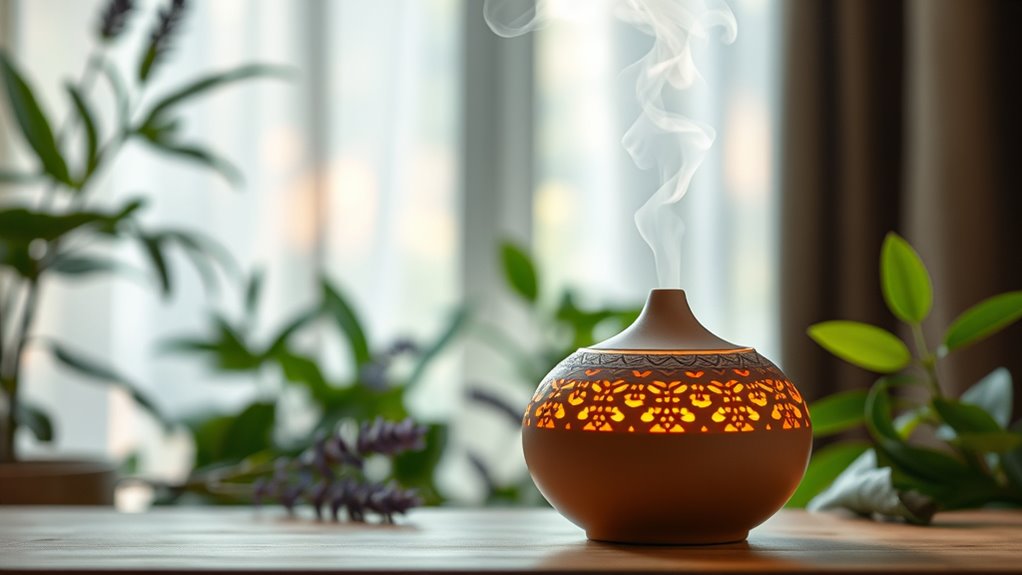Essential oil diffusers can make a noticeable difference in your relaxation routine. They release calming scents into your space, directly influencing your mood and helping to reduce stress. With essential oils like lavender and chamomile, you can enhance your sleep quality and soothe anxiety symptoms effectively. Using a diffuser is often more convenient than applying oils to the skin. If you want to discover which oils work best for you, keep exploring the various options available.
Key Takeaways
- Essential oil diffusers release aromatic compounds into the air, creating a calming atmosphere that promotes relaxation and well-being.
- Inhalation of essential oils, like lavender, stimulates olfactory receptors, enhancing mood and reducing anxiety effectively.
- Regular use of diffusers can transform spaces into restful havens, improving sleep quality and overall emotional resilience.
- Diffusers often utilize ultrasonic technology to produce a fine mist, allowing for prolonged diffusion and maximum therapeutic benefits.
- Incorporating essential oils into your routine can aid in managing stress, enhancing relaxation, and supporting mental well-being.
What Are Essential Oils?
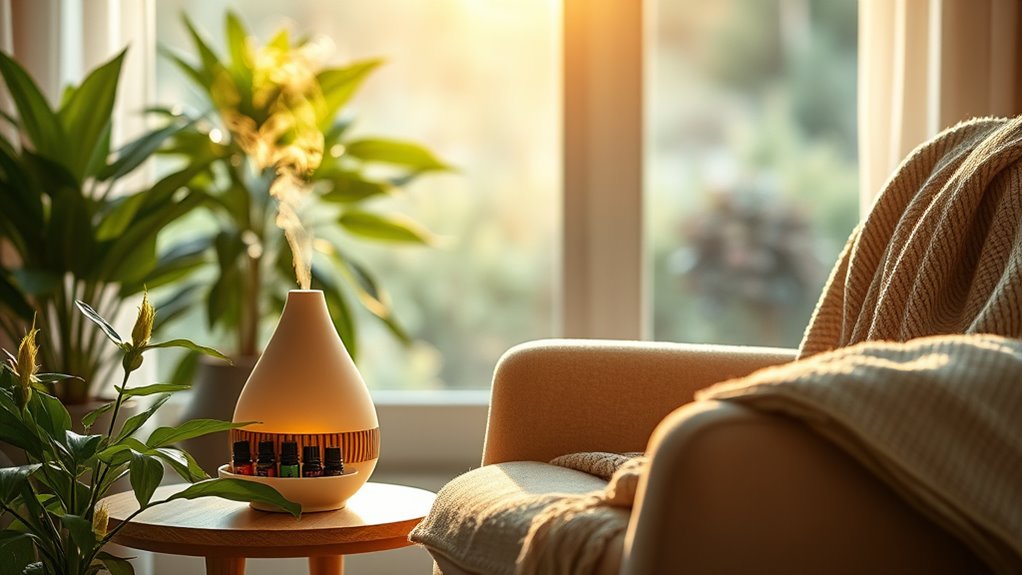
Essential oils are concentrated extracts derived from various parts of plants, like flowers, leaves, and bark, through processes such as steaming or cold pressing.
These potent plant extracts can take several pounds of material to create just one bottle, emphasizing their strength and effectiveness. Quality essential oils, especially those labeled as therapeutic grade, are essential for ensuring you’re getting the most benefits. Essential oils can stimulate hair follicles and offer therapeutic properties for humans. For instance, lavender essential oil is well-known for helping you reduce anxiety and promote relaxation. Additionally, incorporating herbal teas like chamomile into your routine can complement the calming effects of essential oils. Moreover, some essential oils, such as lavender and chamomile, are popular choices for promoting relaxation and enhancing sleep quality. Regular consumption of herbal tea can also enhance overall well-being and comfort. Other popular options include tea tree for acne and peppermint for tension headaches. Choosing whole foods can also support your overall health and wellness, further enhancing the benefits of aromatherapy. Choosing quality essential oils can greatly enhance your aromatherapy experience.
What Is Aromatherapy?
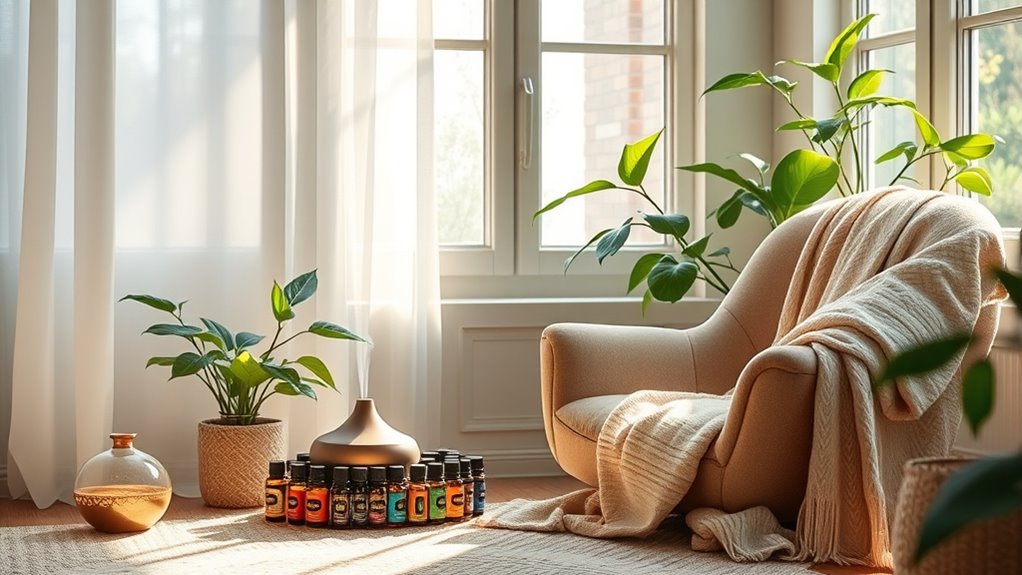
Aromatherapy is a holistic therapy that harnesses essential oils to boost your well-being and manage various symptoms.
With roots in ancient cultures like Egypt, India, and China, it taps into the power of scent to influence your mood and emotions. Additionally, specific essential oils such as eucalyptus oil are known for their therapeutic properties, aiding in respiratory health and promoting relaxation. Moreover, the practice of aromatherapy aligns with mental wellbeing principles, enhancing emotional resilience and encouraging a positive mindset. Furthermore, the use of essential oils can improve indoor air quality, creating a more pleasant and healthful environment. Regularly using essential oils in conjunction with air purifiers can significantly enhance the overall atmosphere in your space. Incorporating healthy eating choices alongside aromatherapy can further enhance your overall wellness and relaxation experience.
Historical Roots and Practices
Though often seen as a modern wellness trend, the practice of using aromatic plants for healing has deep historical roots that span ancient cultures. Aromatherapy, leveraging essential oils, dates back to Egyptian, Indian, and Chinese traditions, where it served therapeutic purposes and spiritual rituals. Hippocrates, the father of modern medicine, recognized its significance for holistic health, promoting relaxation and emotional well-being. Additionally, many individuals today seek to enhance their overall wellness through maximizing IRA contributions that support their long-term health and financial security. The use of essential oils for relaxation has become particularly popular in contemporary wellness practices, as these oils are known for their anti-inflammatory properties that help alleviate stress and tension. Incorporating flavorful appetizers into gatherings can also promote a relaxing atmosphere, complementing the calming effects of aromatherapy. Furthermore, many people choose to decorate their workspaces with low light office plants, which can enhance the overall ambiance and contribute to a serene environment.
| Culture | Historical Use | Key Essential Oils |
|---|---|---|
| Egyptian | Spiritual rituals | Frankincense, Myrrh |
| Indian | Ayurvedic healing | Sandalwood, Jasmine |
| Chinese | Traditional medicine | Peppermint, Ginger |
| Greek | Holistic health practices | Lavender, Rosemary |
| Roman | Baths and relaxation | Thyme, Basil |
Mechanism of Action
When you engage with aromatherapy, you’re tapping into a holistic therapy that harnesses the power of concentrated plant extracts known as essential oils.
Inhaled essential oils stimulate olfactory receptors in your nose, sending signals to your brain that activate the limbic system and hypothalamus. This interaction deeply influences your emotions and physiological responses. As a result, you can experience the release of neurotransmitters like serotonin and dopamine, which can greatly reduce anxiety and improve mood. Additionally, pet therapy has been shown to enhance emotional well-being in patients with conditions such as dementia and Parkinson’s, highlighting the importance of holistic approaches in managing mental health. The calming effects of aromatherapy can be complemented by juice cleanses, which support overall wellness and enhance mood. Moreover, understanding net worth can provide insight into financial health, paralleling how emotional well-being supports overall quality of life. Exploring local tips about wellness practices can further enrich your aromatherapy experience.
Incorporating essential oils for diffusion into your routine can significantly enhance the benefits of aromatherapy.
Aromatherapy’s calming effects on both mind and body make it an effective tool for managing stress and sleep disorders.
Benefits and Applications
Utilizing essential oils in your daily routine not only promotes relaxation but also offers a range of health benefits.
Aromatherapy harnesses the power of essential oils to help you manage stress and anxiety effectively. By inhaling essential oils through essential oil diffusers, you can quickly absorb their calming properties, leading to improved mood and overall well-being. Research shows that oils like lavender can stimulate your nervous system, triggering the release of mood-enhancing hormones such as serotonin and dopamine. This practice can also aid in managing sleep disorders and menstrual cramps, making it a versatile tool to improve your health. Additionally, incorporating glycolic acid products into your skincare routine can enhance your overall sense of well-being by improving skin texture and radiance. Furthermore, adopting healthy habits like consuming high-fiber foods can further support your mental and physical wellness. It’s also essential to store essential oils properly to maintain their potency and effectiveness. Dogs, such as Borzoi, can also benefit from a calm environment created by soothing scents, which can help reduce anxiety during stressful situations.
With the right essential oils, you can create a soothing environment that supports your mental and physical wellness.
Benefits of Essential Oil Diffusers
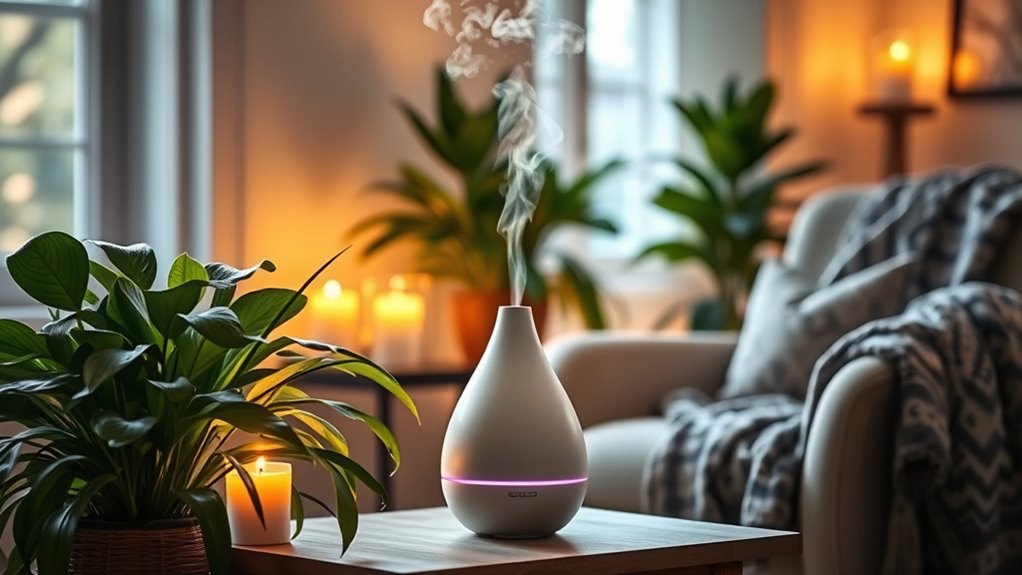
Using essential oil diffusers can create a calming atmosphere that promotes relaxation and helps you unwind after a long day.
Scents like lavender not only soothe your senses but also enhance your sleep quality, making it easier to drift off peacefully.
With a diffuser, you’ll experience these benefits consistently throughout your space, transforming your environment into a restful haven.
Promote Relaxation and Calm
Essential oil diffusers create a soothing environment that encourages relaxation and calm, making them an essential tool for stress relief. By dispersing aromatic compounds into the air, diffusers help promote relaxation and reduce anxiety effectively. When you inhale essential oils, the brain’s limbic system activates, enhancing your mood and alleviating stress.
| Essential Oil | Benefits | Ideal For |
|---|---|---|
| Lavender | Reduces anxiety | Evening relaxation |
| Bergamot | Lifts mood | Stressful moments |
| Chamomile | Promotes tranquility | Meditation |
| Frankincense | Enhances emotional balance | Grounding |
| Ylang Ylang | Lowers heart rate | Calming atmosphere |
Regular use of diffusers contributes to a healthier living space, fostering tranquility and well-being.
Enhance Sleep Quality
Creating a calming atmosphere not only promotes relaxation but can also greatly enhance your sleep quality. By using essential oil diffusers, you can disperse soothing scents like lavender essential oil throughout your room.
Studies show that inhaling lavender can considerably improve sleep and reduce anxiety levels, making it particularly effective for those struggling with insomnia. The calming effects of these essential oils help regulate your heart rate and lower blood pressure, contributing to a more restful sleep experience.
Aromatherapy through diffusers is more efficient than topical application, as inhalation allows for quicker absorption and direct interaction with your brain’s emotional centers.
Improve Sleep Quality
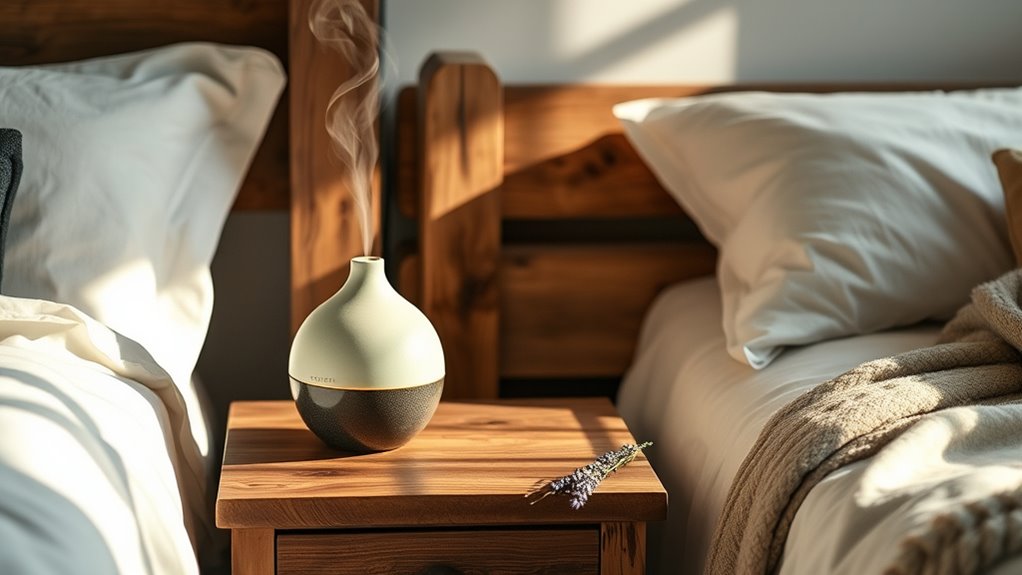
When you struggle with sleep, aromatherapy can be a soothing solution that enhances your rest.
Using a diffuser to disperse essential oils creates a calming environment conducive to deeper sleep.
Here are some benefits of using aromatherapy to improve sleep quality:
- Lavender: Known for its ability to promote relaxation and reduce anxiety.
- Bergamot: Helps regulate heart rate for a more restful atmosphere.
- Inhalation: Diffusers deliver essential oils directly to your lungs, enhancing drowsiness.
- Stress Relief: Aromatherapy alleviates stress and pain, leading to better overall sleep.
- Consistent Use: Regularly using a diffuser can establish a nightly calming routine.
Incorporating these essential oils into your sleep rituals can greatly improve sleep quality and overall well-being.
Soothe Anxiety Symptoms
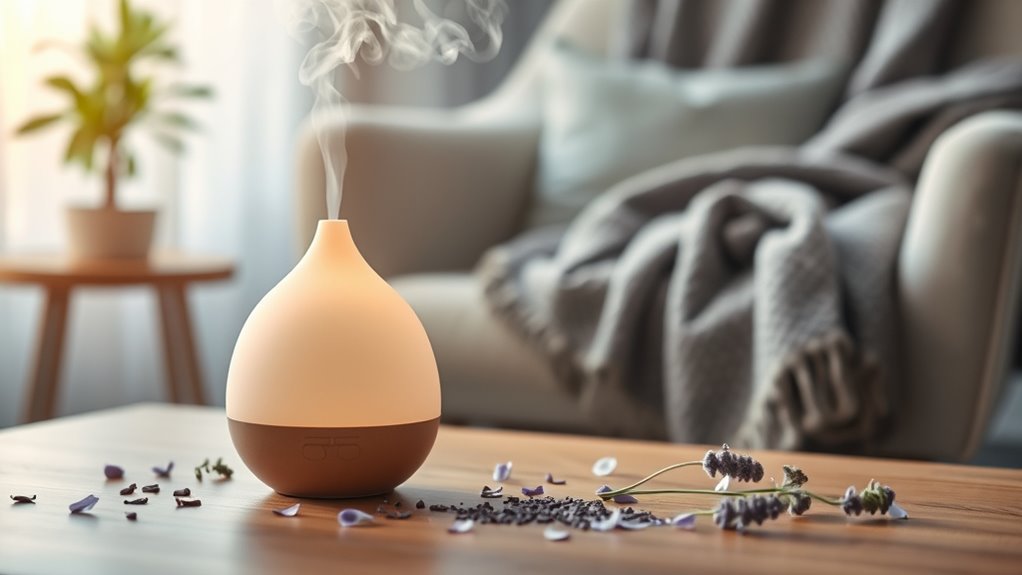
Aromatherapy offers a natural way to soothe anxiety symptoms, making it a valuable tool in your wellness routine. Using essential oils like lavender and chamomile can greatly reduce symptoms of anxiety without the risk of withdrawal.
Inhaling these calming scents has been shown to provide relief during stressful situations, such as before surgical procedures. Valerian oil is another great option, traditionally used to treat anxiety and depression while promoting relaxation.
Jasmine essential oil can help regulate your mood, especially during intimate moments, enhancing your overall emotional well-being. By incorporating these essential oils into your daily practice, you can address health issues related to anxiety and enjoy improved sleep, allowing you to feel more balanced and at ease.
How Do Essential Oil Diffusers Work?
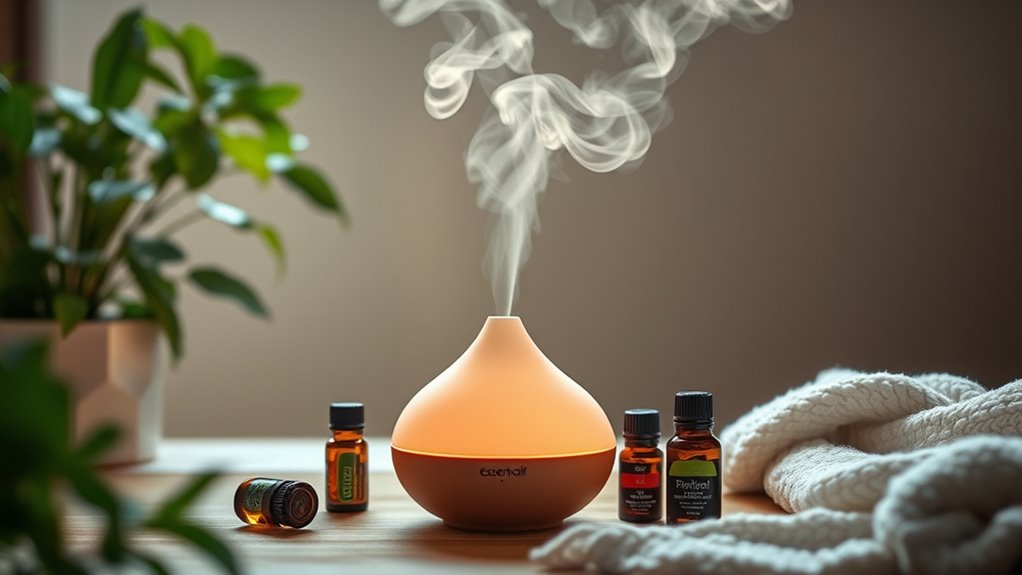
If you’re looking to enhance your experience with calming scents, understanding how essential oil diffusers work can elevate your aromatherapy practice.
Here’s a quick breakdown of their functionality:
- Dispersion: Diffusers release essential oils into the air as a fine mist.
- Ultrasonic Technology: Most use ultrasonic vibrations to mix water with oils, creating a cool mist and preserving their therapeutic benefits.
- Inhalation: Breathing in the mist directly stimulates your olfactory receptors, maximizing the oils’ effects.
- Duration: Depending on the design, diffusion can last for several hours.
- Customization: Many diffusers come with timers and LED lights to enhance your ambiance.
This method allows you to fully enjoy the soothing properties of essential oils, making your aromatherapy sessions more effective.
Best Essential Oils for Relaxation
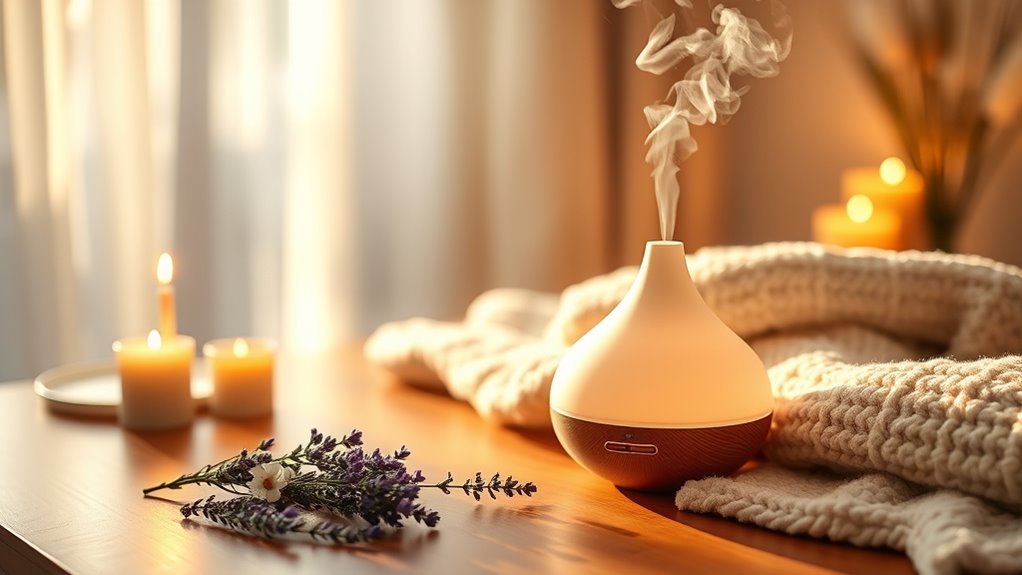
When you’re looking to unwind, lavender essential oil is a top choice for its calming effects on both the mind and body.
You might also find bergamot oil helpful, as it can lift your mood while promoting relaxation.
Together, these oils can create a serene atmosphere perfect for easing stress and enhancing your overall well-being.
Lavender for Calmness
Calmness is a sought-after state, and lavender essential oil stands out as a premier choice for achieving it. Known for its calming effects, lavender can help you unwind and improve your overall well-being.
Here are some benefits of using lavender essential oil:
- Reduces anxiety and promotes relaxation
- Enhances sleep quality for better rest
- Alleviates symptoms of depression
- Influences the brain’s limbic system to regulate emotions
- Versatile use for allergies and nausea
Incorporating lavender into your routine, whether through a diffuser or topical application, can greatly improve your mental state.
Just a few deep breaths of this soothing scent can help you find peace and tranquility in your day.
Bergamot for Mood
A sense of uplift can transform your day, and bergamot essential oil is a fantastic ally in promoting a positive mood. Known for its mood-boosting properties, bergamot helps reduce stress and anxiety while enhancing your overall well-being.
Studies show that inhaling bergamot can greatly lower cortisol levels, the hormone linked to stress. Its uplifting citrus scent can brighten your mood and has been shown to improve emotional states in clinical settings.
Incorporating bergamot into your aromatherapy routine, especially in diffusers during relaxation practices, creates a calming environment. When combined with other relaxing essential oils, bergamot becomes a go-to choice for anyone seeking natural remedies for anxiety or depressive symptoms.
Embrace bergamot for a happier, more balanced mood.
Using an Oil Diffuser vs. Applying Essential Oils to the Skin
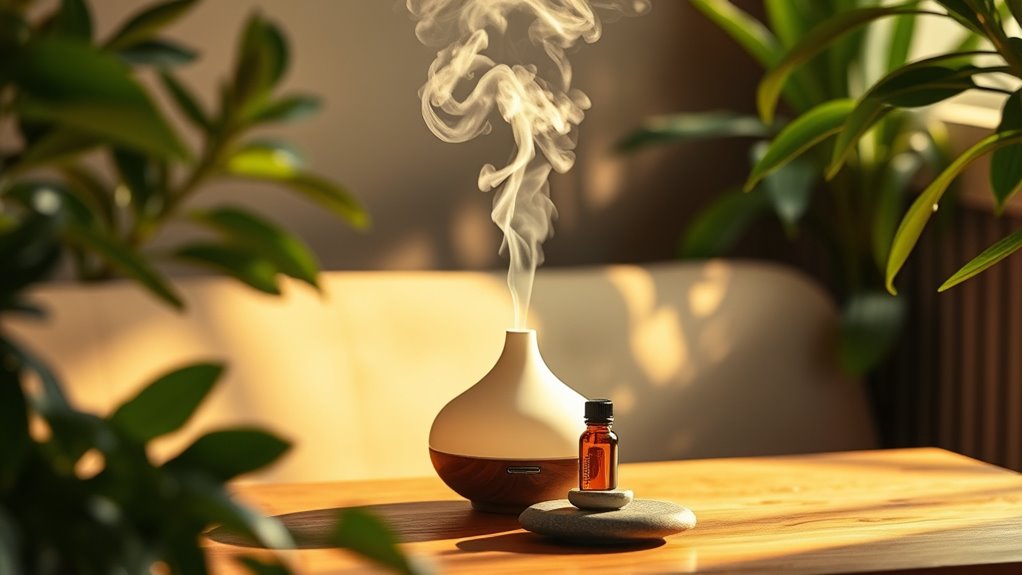
Although both methods offer benefits, using an oil diffuser is often more effective for immediate relaxation than applying essential oils directly to the skin.
Here are some key advantages of using diffusers:
- Inhalation allows essential oils to reach your lungs quickly, providing faster relief.
- Diffusers stimulate the nervous system, activating brain signals for relaxation.
- Topical application may limit results due to skin absorption.
- Diffusers create a calming atmosphere, enhancing sleep quality.
- They effectively reduce anxiety compared to skin application methods.
When you’re looking for overall relaxation and mental well-being, diffusers should be your go-to choice.
They provide a thorough method for enjoying the full benefits of essential oils.
Safety and Cautions When Using Essential Oils
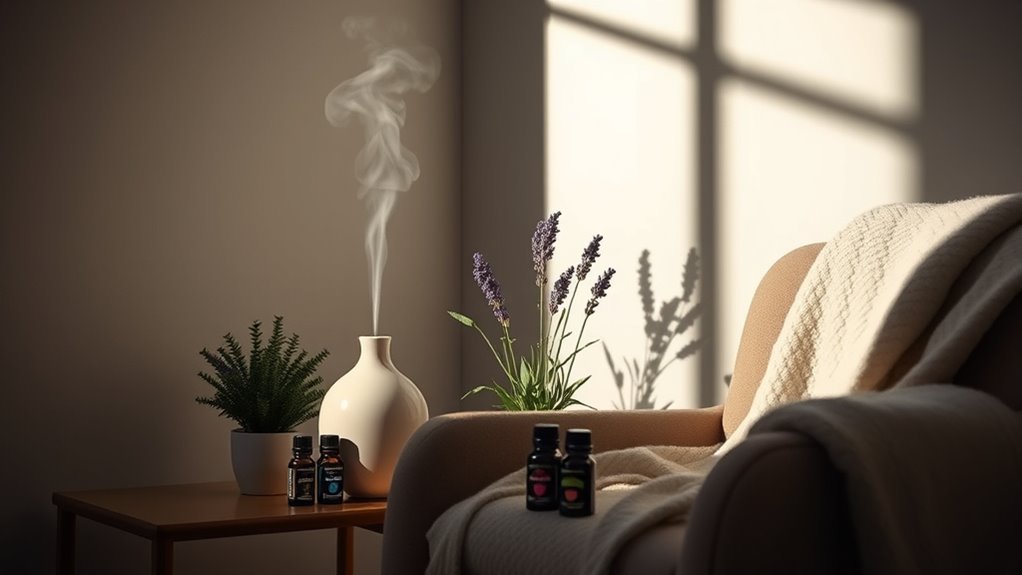
When using essential oils, it’s vital to prioritize safety to prevent potential adverse reactions. Always dilute essential oils with a carrier oil before applying them to your skin.
If you have asthma, allergies, epilepsy, or migraines, consult your healthcare provider before using any essential oils. Pregnant individuals and those on medication should also seek professional advice to guarantee safety.
Additionally, be aware that essential oils are flammable; keep them away from open flames and heat sources to avoid fire hazards.
Remember, the quality of essential oils matters—opt for high-quality, organic, or therapeutic-grade oils, as lower-quality options may contain cheaper ingredients that could lead to adverse reactions.
Your safety comes first!
Tips for Choosing Quality Essential Oils
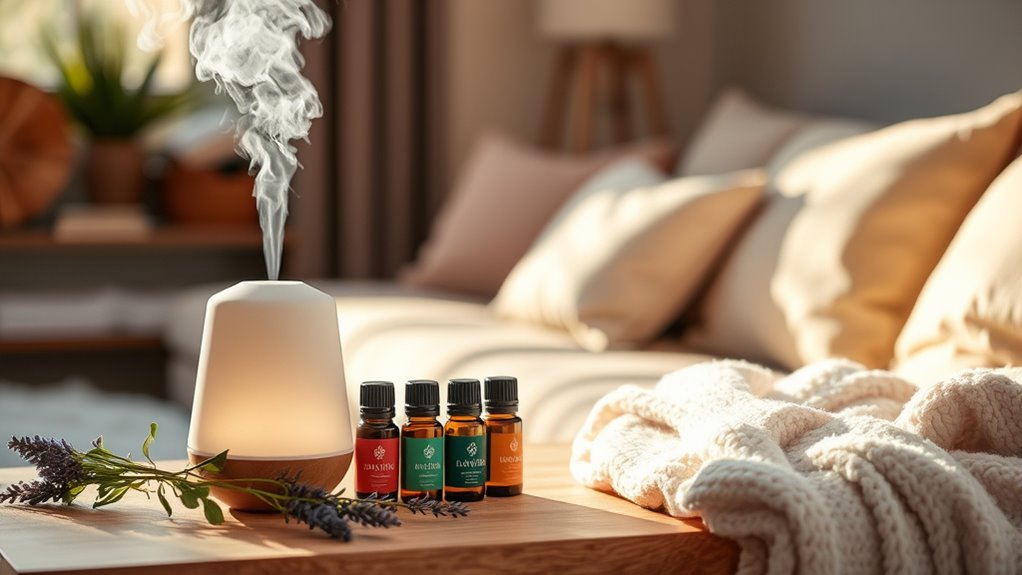
Choosing quality essential oils is crucial for ensuring you reap their full benefits. When selecting essential oils, keep these tips in mind:
- Look for high-quality, organic, or therapeutic-grade options to guarantee purity and efficacy.
- Check the sourcing and extraction methods; prefer steam distillation and cold pressing for the best results.
- Always read labels carefully for the botanical name and avoid any products with synthetic fragrances or additives; pure essential oils should contain only the plant extract.
- Buy from reputable brands with positive reviews and transparent sourcing practices.
- Be cautious of extremely low-priced essential oils, as they may signal poor quality or adulteration. Investing in oils with a certificate of analysis provides added assurance.
Frequently Asked Questions
Do Diffusers Help You Relax?
Yes, diffusers can help you relax. By dispersing aromatic molecules into the air, they create a calming atmosphere that promotes tranquility.
When you inhale essential oils, they quickly reach your brain’s limbic system, fostering a sense of peace. Many people find that using a diffuser, especially with soothing scents like lavender, greatly improves their mood and reduces anxiety.
Incorporating a diffuser into your routine can enhance your overall mental well-being.
What Is the 30/50/20 Rule for Essential Oils?
The 30/50/20 rule for essential oils is a guideline that helps you create balanced blends.
You use 30% top notes, like citrus or mint, which evaporate quickly; 50% middle notes, such as floral or herbal oils; and 20% base notes, like sandalwood or cedarwood, that provide richness.
This approach not only enhances the aroma but also targets specific emotional or physical needs, making your essential oil experience more effective and enjoyable.
How Do Aromatherapy Diffusers Work?
You might think using an aromatherapy diffuser is complicated, but it’s really simple.
To use one, you add water and a few drops of your favorite essential oil. The diffuser then uses ultrasonic waves or heat to break the oil into tiny particles, releasing them into the air.
As you inhale, these tiny molecules engage your senses, promoting relaxation and enhancing your mood almost instantly.
Just breathe deeply, and enjoy the calming effects.
What Is the Best Essential Oil to Diffuse for Anxiety?
When you’re looking to alleviate anxiety, lavender essential oil is a top choice. It’s well-researched and known for its calming effects.
Citrus oils like bergamot and sweet orange can also boost your mood and reduce anxiety.
Jasmine oil works wonders in creating a relaxed atmosphere, especially in intimate settings.
Don’t forget about valerian and chamomile; both can help ease stress and promote a peaceful environment.
Choose what resonates with you!
Conclusion
Incorporating essential oil diffusers into your routine can be like adding a gentle breeze to a stuffy room, bringing in fresh tranquility. By exploring the soothing benefits of aromatherapy, you can transform your space into a haven of relaxation. Whether you’re easing anxiety or improving sleep, the right essential oils can work wonders. Just remember to choose quality oils and use them safely, and you’ll be well on your way to a calmer, more balanced life.
